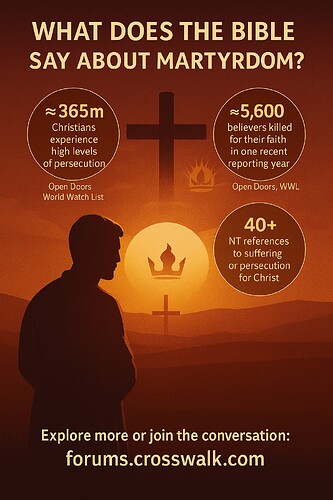What Does the Bible Say About Martyrdom?
From the earliest days of the church, believers have wrestled with the sobering reality of martyrdom—laying down one’s life for the sake of Christ. But how should we understand this call today, and what does Scripture actually say about the cost of faith?
#Martyrdom #FaithUnderFire #CostOfDiscipleship #christianforums #crosswalkforums #forums #crosswalk #faithcommunity #faithforums
The word martyr comes from the Greek word for “witness.” In the New Testament, we see this lived out in figures like Stephen, the first Christian martyr, whose bold testimony led to his death by stoning. From there, throughout history, countless believers have faced persecution and even death rather than renounce their faith.
For some, martyrdom is the highest form of discipleship, a powerful witness that demonstrates unwavering allegiance to Christ even in the face of suffering. For others, it raises difficult questions about calling, suffering, and whether all Christians should be prepared for such a sacrifice.
Even today, reports from around the world remind us that martyrdom is not just a historical reality—it is happening now. Stories of believers losing jobs, facing imprisonment, or even giving their lives for the gospel highlight that Jesus’ words, “If they persecuted me, they will persecute you also” (John 15:20), are still unfolding.
But here’s the tension: Is martyrdom something to be sought, embraced only if it comes, or avoided if possible? Does the Bible portray it as a unique calling for some believers, or as an expectation for all who follow Christ?
This question forces us to consider not only how we view suffering, but also how we define faithfulness in a world that often opposes the gospel.
Read more here:

